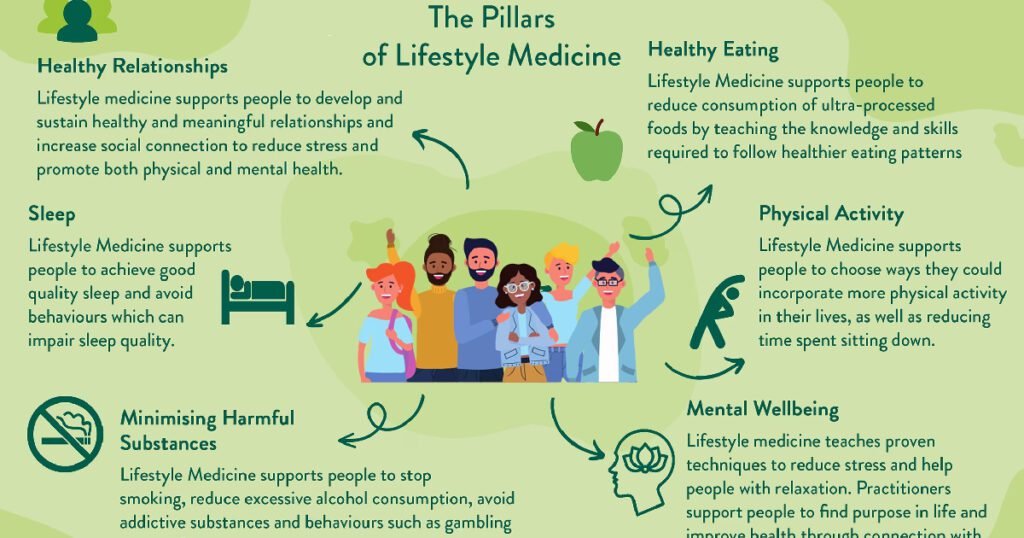Introduction
Lifestyle Medicine – What it means
I met a doctor at a conference the other day who said that Lifestyle Medicine is not real. Adopt a New Lifestyle containing eating healthy, working out regularly enough sleep, and relaxation from everyday work morose management strategies that help you be oblivious after challenging days to bounce back by providing unaltered tobacco or various device substances.
Relevance and Importance
In an era of increasing chronic diseases such as diabetes, heart disease, and obesity at skyrocketed levels throughout the world population Lifestyle Medicine is an evidence-based medical specialty that offers a much-needed proactive approach to care delivery. It helps in addressing the underlying causes of these conditions – granting a person the power to help himself/ herself gain health and well-being.
Impact on Chronic Diseases
This may take the form of lifestyle-related chronic diseases. Some of what we eat and our amount of exercise, stress levels, or substance abuse can contribute greatly to these health conditions. The goal of Lifestyle Medicine is to address these risk factors through sustainable and beneficial lifestyle changes.
Role in Preventive Health
Prevention was one of the pillars of Lifestyle Medicine built to elevate our preventive health focus. Establishing healthy lifestyles today offers the best chance of lowering long-term health risks from chronic diseases and averts healthier lives, and well-being for all at sustainable development goal 3. Prevention keeps us healthier, for both individual health and to reduce the burden on our healthcare systems.
Types and Categories
Lifestyle Medicine Areas of Significance
Nutrition
Balanced diet | Health themes Whole, plant-based foods provide the necessary nutrients with the whole minimization of processed food, sugars, and unhealthy fats is a focus in Lifestyle Medicine.
Physical Activity
Physical fitness is a great importance in our daily life. Exercise keeps you healthy, helps in weight loss/management, and is good for your heart while at the same time doing wonders for mental well-being.
Stress Management
If left alone, chronic stress can cause health problems. Lifestyle Medicine involves stress management through strategies such as mindfulness, meditation, and using activities that support the relaxation response.
Sleep Hygiene
A good amount of sleep is a key component of health. Lifestyle Medicine also endorses interventions for normalizing sleep, like perpetuating a sleep-wake rhythm and constructing favorable surroundings conducive to effective slumber.
Substance Abuse Control
Smoking, over-drinking, and going off the track with recreational drugs are not only dangerous but also make you unhealthy. By employing Lifestyle Medicine, individuals can live a better life and be free from addictions.
Social Connectedness
Healthy relationships translate into emotional and physical health. Core to Lifestyle Medicine is the use of supportive relationships.
Symptoms and Signs
Signs of a Bad Lifestyle
Physical Symptoms
By adopting negative habits, you may experience some notable outward effects – unwanted weight gain, chronic fatigue, exhaustion, or poor digestion (blotting), as well as frequent sick days and illness.
Mental Health Symptoms
Lifestyle greatly impacts mental health. The symptoms include worrying, mood disorders, tiredness and forgetfulness.
Behavioral Signs
Signs, such as heightened irritability and a lack of motivation or withdrawal from social activities could be signs that their lifestyle choices are not on point.
Causes and Risk Factors
Biological Factors
Genes versus Lifestyle (4:34 Mins) We can’t ignore genetics when it comes to determining a person’s health, but genes only control 5-10% of the expression. Lifestyle ways can be tailored considering those biological predispositions.
Environmental Factors
Similarly, environmental factors including the availability of healthy foods physical activity, and exposure to pollutants also influence lifestyle choices and therefore impact health.
Lifestyle Factors
Diet
Highly processed foods which are high in sugar and unhealthy fats lead to many chronic diseases along with metabolic syndrome. Minimize these risks by sticking to whole, plant-based foods.
Physical Inactivity
Promoting Physically Active Behaviour: Leading a sedentary life has a lot of health consequences like obesity cardiovascular diseases etc. Regular exercise is important for your overall well-being.
Substance Use
Smoking, drinking, and taking drugs are unhealthful. Because a healthy lifestyle is all about NOT taking these substances.
Diagnosis and Tests
Screening Methods
Health Risk Assessments
Based on health risk assessments, an individual’s lifestyle and the predictive power for chronic disease can be evaluated providing a platform of personalized interventions.
Biomarker Testing
This refers to taking laboratory samples like blood tests and looking at machines that scan for very early indicators of chronic disease and the effect lifestyle interventions have on these risk markers e.g. sugar levels or cholesterol)
Diagnostic Tools
Physical Exams
Getting a physical on an annual basis is extremely necessary for catching potential health conditions before they become apparent and assessing your overall well-being.
Laboratory Tests
Laboratory tests, such as blood and urine tests perform a very important role in decision-making regarding the treatment of an individual based on health information.
Psychological Evaluations
Most mental health assessments are about lifestyle: depression, anxiety…
Treatment Options
Medical Treatments
Medications
For some chronic diseases, medications are needed. But Lifestyle Medicine hopes to make medicines fall to the wayside, burying medication with changes that mend a life.
Surgical Interventions
Surgical interventions are needed for some conditions. Lifestyle modifications will complement these treatments for better prospects.
Cognitive Behavioral
Cognitive-behavioral therapy Or CBT is psychotherapy, it not only helps the person to learn new cognitive skills but also modifies certain identification behaviors and in turn integrates a healthy lifestyle.
Physical Therapy
Physical therapy helps in post-injury recovery and physical function enhancement, which complements a gym regimen.
Lifestyle Adjustments
Dietary Changes
A foundational principle of Lifestyle Medicine is consuming a balanced, whole-food diet. This may involve cutting down processed and upping the intake of fruit/veg.
Exercise Regimens
It would surely contain some sort of routine that is both enjoyable and out there for the rest of your life.
Stress Reduction
Yoga, Meditation, and Relaxation Exercises Practice these stress relief techniques every day for overall well-being.
Preventive Measures
Healthy Eating Guidelines
The consumption of whole-natural plant-based foods, lean proteins, and good fats is vital in preventing the majority of chronic diseases. Physical activity helps to effectively modify BE and this potential mechanism could be maximized by a self-monitoring plan that may enhance the capacity for change, which can help directly in improving not only exercise but also other health-related behaviors. “Exercise Therapy Physical Exercises (Ex)” is recommended at least 30 minutes per session on five days of each week: untimed walking; running outdoors or indoors treadmill); cycling (outdoor), swimming16-18,20-22.
Stress Management Strategies
Regular practice of mind training, meditation, and relaxation techniques will help you to manage stress and support on mental health.
Sleep Hygiene
Examples of sleep hygiene practices are: Go to bed at the same time every night Make your bedroom relaxing (dark; cool) Do not use screen devices 1 hour before bedtime.
Avoiding Harmful Substances
Not smoking, drinking in moderation, and not doing drugs are three important health practices.
Building Social Connections
Strong social connections and community involvement deliver benefits to overall health and emotional understanding.
Anecdotes or Case Studies
Real-life Examples
Success Stories
Listening to people who are successfully incorporating Lifestyle Medicine can offer inspiration and tips.
Some struggles and how to overcome them.
Telling stories of obstacles faced and conquered in achieving a healthier lifestyle can inspire.
Expert Insights
Advice from Scientists
It makes this article appear more rooted in reality and credible to people who know more than they do about the subject of our profession (Lifestyle Medicine).
Research Findings
The latest research summaries illustrate the scientific cornerstones and efficacy of Lifestyle Medicine.
Professional Advice
Professional advice from healthcare providers on how to reduce Lifestyle Medicine into practice for the readers.
Conclusion
Summary of Key Points
In essence, it encapsulates the key elements of Lifestyle Medicine and what one can do to promote health.
Further education call to action
By encouraging readers to investigate more and utilizing the resources provided, you enable them in their quest for better health.




